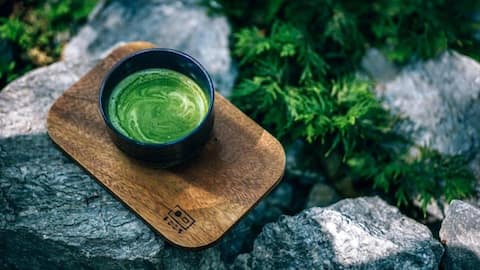The rise of matcha: How it became a global trend
What's the story
The matcha latte, a unique blend of matcha powder and milk, first emerged in New York's local cafes and coffee shops around 2015. It quickly gained popularity among the younger generation, leading to the establishment of matcha-focused cafes in major cities such as Los Angeles, London, Sydney, and Hong Kong. High-profile celebrities like Gwyneth Paltrow and Kylie Jenner have also endorsed this trend.
Wellness trend
Health consciousness fuels matcha's popularity
Rocky Xu, the founder of Los Angeles's Rocky's Matcha, attributes the success of matcha to the growing emphasis on health and wellness over the past decade. Xu believes that as people become more knowledgeable about nutrition, tea lovers are drawn toward healthier alternatives like matcha tea. This powdered form of green tea has its roots in China but is most commonly associated with Japan.
Cultural significance
Matcha's historical roots and modern appeal
Matcha was introduced to Japan by Chinese Buddhist monks in the 12th century and was appreciated for its soothing yet stimulating effects. It became a favorite among the elite and samurai classes, and by the 15th century, it was an essential part of the Japanese tea ceremony. Hannah Habes from New York's Matchaful believes matcha's appeal extends beyond its health benefits, highlighting its steady caffeine boost without the crash often associated with coffee.
Culinary innovation
Matcha's versatility inspires innovative concoctions
The versatility of matcha has led to a variety of innovative creations including smoothies, lemonades, shots, baked goods, and even ice cream. Laura Li from Hong Kong's first matcha cafe, Matchali, aims to make matcha more accessible by emphasizing its health benefits and using high-quality ingredients. Matcha comes in two grades: ceremonial and culinary. Xu recommends ceremonial grade matcha for its superior taste and antioxidant benefits.
Harvest impact
Matcha grades: Harvest impact on quality
Xu explained that culinary grade matcha typically originates from a second or third harvest, resulting in reduced antioxidants, less vibrant color, and a more bitter taste. Experts advocate for purchasing ceremonial grade matcha, primarily sourced from Uji near Kyoto, for its enhanced antioxidant properties and superior flavor, achieved through meticulous cultivation methods. The richness of color and aroma signifies higher quality.
